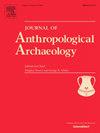注意时间上的差距:公元前2000年爱琴海对过去物质的记忆、遗忘和忽视
IF 2.2
1区 社会学
Q1 ANTHROPOLOGY
引用次数: 0
摘要
来自公元前2000年爱琴海的丰富多样的证据可以深入分析过去的物质在这一时期是如何被对待的。记忆、遗忘和忽略一直是社会在不同场合使用的重要工具,具有不同的意义和目的。爱琴海的记忆景观提供了一个物体和景观的模板,根据相对较新的或较古老的过去的使用,它们得到了不同的处理。它们的功能和意义也有很大的不同,而它们的重新解释往往类似于它们属于同一时间和文化背景(同一时间类型)或不属于同一时间类型(不同时间类型)的程度。此外,还强调了遗忘和忽视物体和景观在记忆、遗忘和新文化条件形成中的作用。在公元前2000年的爱琴海,在过去的物质和景观的使用中,可以认识到某种地域特征的折衷主义。它们通常与形而上学和末世论的语境联系在一起。本文章由计算机程序翻译,如有差异,请以英文原文为准。
Mind the chronological gaps: The remembering, forgetting and ignoring of past materiality during the 2nd millennium BC Aegean
The rich and diverse evidence from the 2nd millennium BC Aegean allows indepth analyses of how past materiality was treated in this period. Remembering, forgetting and ignoring have been important tools employed by societies on various occasions and with different meanings and aims. The mnemonoscape in the Aegean has provided a template of objects and landscapes, which received diverse treatments depending on the relatively recent or older past uses. There had also been significant variations in their functions and meanings, whilst their re-interpretation had often been analogous to the degree they belonged to same temporal and cultural context (same chrono-type) or not (different chrono-type). Furthermore, it is highlighted how forgetting and ignoring objects and landscapes played a role in memory, oblivion and the formation of new cultural conditions. A certain eclecticism of regional character can be recognized in the employment of past materiality and landscape in the 2nd millennium BC Aegean. It had often been the case that they had been associated with metaphysical and eschatological contexts.
求助全文
通过发布文献求助,成功后即可免费获取论文全文。
去求助
来源期刊

Journal of Anthropological Archaeology
Multiple-
CiteScore
4.00
自引率
11.10%
发文量
64
期刊介绍:
An innovative, international publication, the Journal of Anthropological Archaeology is devoted to the development of theory and, in a broad sense, methodology for the systematic and rigorous understanding of the organization, operation, and evolution of human societies. The discipline served by the journal is characterized by its goals and approach, not by geographical or temporal bounds. The data utilized or treated range from the earliest archaeological evidence for the emergence of human culture to historically documented societies and the contemporary observations of the ethnographer, ethnoarchaeologist, sociologist, or geographer. These subjects appear in the journal as examples of cultural organization, operation, and evolution, not as specific historical phenomena.
 求助内容:
求助内容: 应助结果提醒方式:
应助结果提醒方式:


